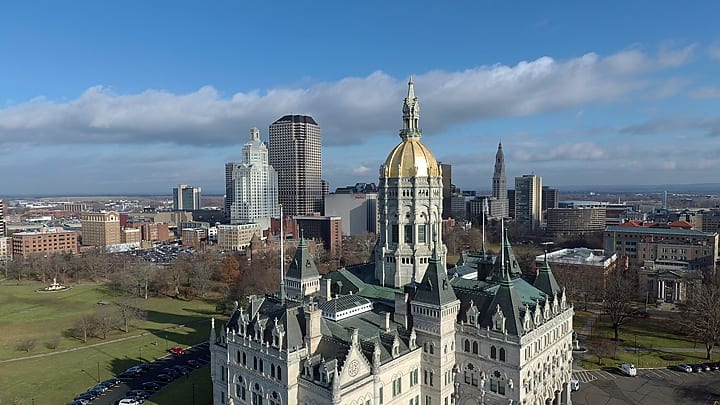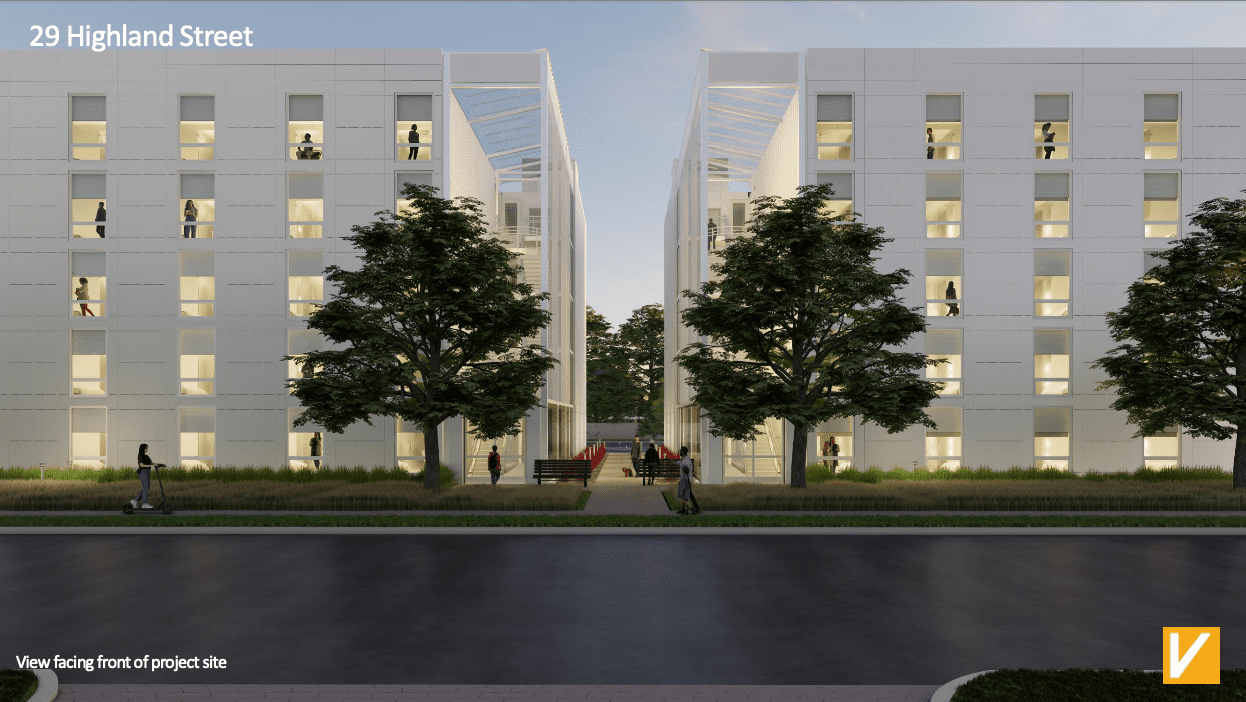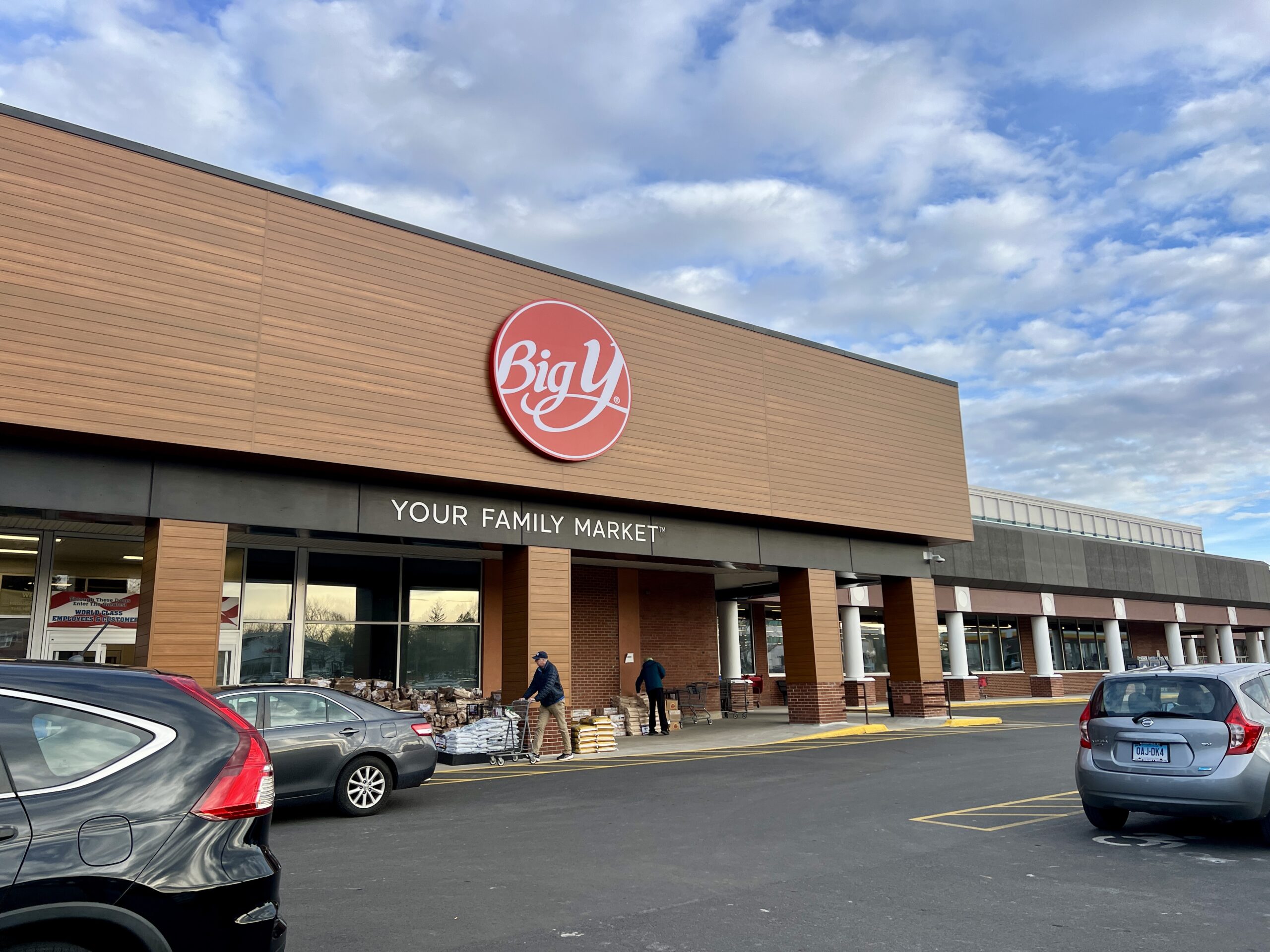Legislative Leaders Embracing Technology as Pandemic Drags into 2021 Session

Audio By Carbonatix

Connecticut State Capitol Building. Courtesy of CTNewsJunkie.com
Legislative leaders are hoping that the rollout of the COVID-19 vaccine will allow them to resume something closer to a typical session in the spring.
By Hugh McQuaid, CTNewsJunkie.com
Connecticut legislative leaders are exploring plans to conduct an outdoor swearing-in ceremony next month in what could be the first of many accommodations made in the coming session as a result of the ongoing pandemic.
If January weather cooperates, lawmakers may take the oath of office on Jan. 6 standing outside the state Capitol building rather than in the legislative chambers. The change would be a chilly concession to the COVID-19 virus, which is expected to force much of the early session to the digital realm and limit the number of proposed bills.
“You could see a scenario where we could swear everybody in outside,” incoming House Speaker Matt Ritter said Thursday. “If the weather does not cooperate we’re going to have to do something from the office, on the computer screen, or maybe rotate people in the chamber in groups.”
What legislative leaders will not do is pack the chambers full of lawmakers and guests for the traditional opening day ceremonies. The governor’s annual state of the state address will likely look more like a Zoom conference in 2021.
Asked during a remote news briefing how he would address the legislature next month, Gov. Ned Lamont said, “I think it will be sort of like this.”
Incoming House Minority Leader Vincent Candelora said leaders are planning on limiting guests but are looking for ways to accommodate freshman lawmakers who are preparing to be sworn in for the first time.
“It’s difficult,” he said. “We all feel bad for the freshmen, we’re trying to provide them with some kind of meaningful experience. Although we’ll all never forget this one.”
“Whatever we do, we’ll be very mindful of COVID restrictions,” said Ritter, D-Hartford. “It will be a very different opening day that’s for sure.”
The day will kick off what is shaping up to be a very different legislative session. The state Capitol building is currently closed to the public and will remain that way for at least the first few months of the coming session.
Ritter said that committee chairs spent part of Thursday in training, brushing up on digital conferencing technology like Zoom. Committees will use the platforms to conduct meetings and public hearings remotely. Although the digital process restricts access to the legislative process in some ways, Ritter said it also expands access for residents who cannot physically make it to the state Capitol.
“You are giving people who otherwise have a hard time getting to Hartford the ability to testify from their living room, which is a nice change,” he said.
But the new format also presents challenges. Candelora, D-North Branford, said the remote setting will have an impact on a process that often hinges on face-to-face interactions.
“So much of the bill process is about human interaction, grabbing someone on a stairwell, or having a group meeting with people sitting down in a room and debating a bill,” he said.
Lobbyists will also find themselves watching the session from more of a distance in the coming year. Typically, many lobbyists spend time during sessions in the committee rooms of the Legislative Office Building or designated areas on the second and third floor of the state Capitol building. They follow the process and chat with lawmakers.
Lobbyist Kate Robinson, of Gallo & Robinson, said it will be different and frustrating trying to follow the process from a computer at her dining room table. Normally, she could watch a pair of lawmakers depart the Judiciary Committee room to discuss something on the perch between the two escalators of the Legislative Office Building.
“That [discussion] could be something that benefits my client or it could be something that doesn’t benefit my client. I can usually intuit it. Something’s up. My antennae go up. I’m not going to be able to do that now,” she said. “But neither is anybody else.”
The remote format will also limit the extent to which groups can demonstrate their positions on bills. During a session, it’s common to see an advocacy group crowd a public hearing room in matching T-shirts.
Incoming Senate Minority Leader Kevin Kelly pointed to groups like the AARP, whose members sometimes gather in the Legislative Office Building wearing red shirts.
“When there’s an issue that’s important to them, they show up in force, in red to let it be known that they like or dislike a certain proposal. Where do those individuals show up in a virtual world?” asked Kelly, R-Stratford.
Legislative leaders are hoping that the rollout of the COVID-19 vaccine will allow them to resume something closer to a typical session later in the year. Ritter said he hoped vaccinations would allow at least the last month of the session, between May and June, to run more normally.
“If we can open the building, we want to. If we can open even on a limited basis we want to. We want to provide as much access as possible but it’s really going to depend on the speed of vaccinations and where hospitalizations are and the comfort level of our members,” he said.
The coming session will also see new technology installed in the Senate chambers. Senate President Sen. Martin Looney said the Office of Legislative Management was in the process of negotiating with vendors to install a new scoreboard in the upper chamber, allowing senators to cast votes on bills from their offices. The change will reduce the need for senators to be physically present for roll call votes and mirrors a step taken by the House of Representatives this year.
It is likely the pandemic will also reduce the number of bills raised for consideration during the coming session. Lawmakers on both sides of the aisle talked about looking for opportunities to combine related concepts for a session with fewer moving parts. The idea is to simplify the process and reduce the strain on the legislature’s nonpartisan staff.
But that does not necessarily mean the number of concepts raised will be narrowed. Looney said many lawmakers are looking to make up for time lost during the 2020 session, which was cut short due to the pandemic.
“Given the fact of the loss of opportunity to move on a number of issues last year, there is sort of pent up interest and pent up demand, but just as a practical matter I don’t think we can handle the volume of bills that we would in a normal session,” Looney said.
The 2021 session seems certain to demand an unusual degree of flexibility from the legislature. It will be a “unique year,” Ritter said Thursday. Zoom may not always work as intended and lawmakers may struggle with intermittent internet connections.
“The decisions we make about how we operate, the bills we run. It will all be a reflection of understanding those limitations,” he said. “Everyone has to be flexible to know that every month the situation could change.”
Candelora put it another way.
“As I said to the freshmen class, all the legislators are freshmen right now. We are really going to be flying blind and figuring things out while we go.”
Republished with permission from CTNewsJunkie.com, all rights reserved.
Like what you see here? Click here to subscribe to We-Ha’s newsletter so you’ll always be in the know about what’s happening in West Hartford! Click the blue button below to become a supporter of We-Ha.com and our efforts to continue producing quality journalism.



